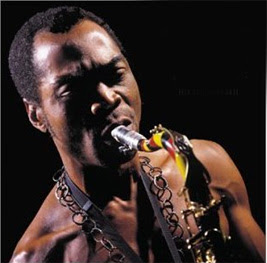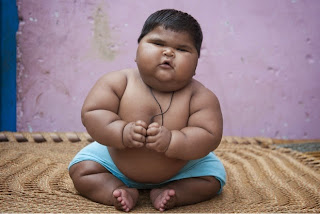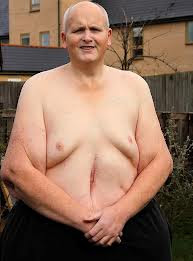The Black President: Fela Kuti
Born in Nigeria, a young Fela was sent to London in 1958 to study medicine but decided to study music instead at the Trinity College of Music. While there, he formed the band Koola Lobitos, playing a fusion of Jazz, Funk, Ghanaian/Nigerian High-life, Psychedelic Rock, and traditional West African chants and rhythms, singing mostly in Pidgin English and some songs in his native Yoruba language.
This would be the foundation to what would become "Afrobeat" a style of music which Fela had Incorporated from different genres and countries to compose what would be the soundtrack to their revolution in Nigeria.
"Water no get enemy"
Fela's social activism was ignited whilst on tour in America, witnessing The Black Panther movement which lead to Fela renaming his band the Nigeria 70 (Later changed to the Africa 70). His music was more than just scathing attacks on politicians or a revolts against the system, it was music that was intricately put together like blindfolded synchronised unicyclists juggling confetti in a room full of fans set to full blast.
Joy and suffering would undoubtedly be a trend in Fela's life, from the highs and success of his music championing a movement in his homeland.
To the infamous run - ins with the Nigerian authorises - which lead to the burning of his studio and the unfortunate death of his mother (who was said to have been thrown from a window during a raid by one thousand army officers).
Fela's music was as colourful as his life and forming his own political party was inevitable.
Movement of the People, (Fela's political party) coincided with the renaming of his band to the Egypt 80. Fela would delve into the murky world of politics to which his music had been vehemently fought against, but setbacks would ensue, and his candidacy would be refused.
"I.T.T. (International Thief-Thief)"
Fela would keep touring, keep fighting against the corruption that sort to stagnate his beloved Nigeria. He kept making music into the early 1990's - but to the shock of a nation and the world in 1997 Fela was pronounced dead after a long battle with illness, he had succumb to the beatings, imprisonment, and many attempts on his life. Fela, who no doubt died from an illness from within.
The legacy which he would leave has stretched far and wide, with his two sons (Femi and Seun) taking on the mantle of their fathers work. And making sure what he stood for and what he and those around him had sacrificed should not be forgotten.
Fela the Broadway show (2009) which was produced to critical acclaim (11 Tony nominations) by Shawn "Jay-z" Carter and Will & Jada Pinkett Smith.
The success of the Broadway hit wasn't a shock to many - Fela had influenced music and popular culture long after his passing.
"Zombie"
I have met many people over the years, from different backgrounds and parts of the world who have said that:"Fela's music changed my life." Which is a very true statement in my eyes, not only is he a hero to many Nigerians who were involved or witnessed his struggle or merely live by it through folklore passed down from their parents. Fela's music has captured many non Nigerians like myself, who can't possibly do mundane tasks without some Fela playing in the background.
Abdi, TCC



Comments
Post a Comment